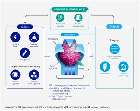Frontiers | Organoid intelligence (OI): the new frontier in biocomputing and intelligence-in-a-dish
Recent advances in human stem cell-derived brain organoids promise to replicate critical molecular and cellular aspects of learning and memory and possibly a...

I'm skeptical about it becoming practical. Even if they are effective it forces a point of view around ethics and the sanctity of life.
Indeed and yet the work continues, so choices have been made in those regards, I think.
The conspiracy is creating organic life and that's bad, m'kay
Human brain cells and a new kind of mechanical intelligence that rivals AI. This has been in the works a while.
https://www.the-scientist.com/news-opinion/how-neurons-in-a-dish-learned-to-play-pong-70613
Organoid Intelligence will overtake AI: https://youtu.be/hMdam6kviAc?si=Jzg0Szm1TRVCYBZB 03:37
Thomas Hartung and colleagues | The future of organoid intelligence | Frontiers Forum Deep Dive 2023
https://youtu.be/3dIjWDCchtc?si=QZXifGDy2NK6kvtr 1:24:52
https://www.sciencealert.com/scientists-built-a-functional-computer-with-human-brain-tissue
https://neurosciencenews.com/brain-cell-chips-speech-recognition-25352/
Abstract
Recent advances in human stem cell-derived brain organoids promise to replicate critical molecular and cellular aspects of learning and memory and possibly aspects of cognition in vitro. Coining the term “organoid intelligence” (OI) to encompass these developments, we present a collaborative program to implement the vision of a multidisciplinary field of OI. This aims to establish OI as a form of genuine biological computing that harnesses brain organoids using scientific and bioengineering advances in an ethically responsible manner. Standardized, 3D, myelinated brain organoids can now be produced with high cell density and enriched levels of glial cells and gene expression critical for learning. Integrated microfluidic perfusion systems can support scalable and durable culturing, and spatiotemporal chemical signaling. Novel 3D microelectrode arrays permit high-resolution spatiotemporal electrophysiological signaling and recording to explore the capacity of brain organoids to recapitulate the molecular mechanisms of learning and memory formation and, ultimately, their computational potential. Technologies that could enable novel biocomputing models via stimulus-response training and organoid-computer interfaces are in development. We envisage complex, networked interfaces whereby brain organoids are connected with real-world sensors and output devices, and ultimately with each other and with sensory organ organoids (e.g. retinal organoids), and are trained using biofeedback, big-data warehousing, and machine learning methods. In parallel, we emphasize an embedded ethics approach to analyze the ethical aspects raised by OI research in an iterative, collaborative manner involving all relevant stakeholders. The many possible applications of this research urge the strategic development of OI as a scientific discipline. We anticipate OI-based biocomputing systems to allow faster decision-making, continuous learning during tasks, and greater energy and data efficiency. Furthermore, the development of “intelligence-in-a-dish” could help elucidate the pathophysiology of devastating developmental and degenerative diseases (such as dementia), potentially aiding the identification of novel therapeutic approaches to address major global unmet needs.